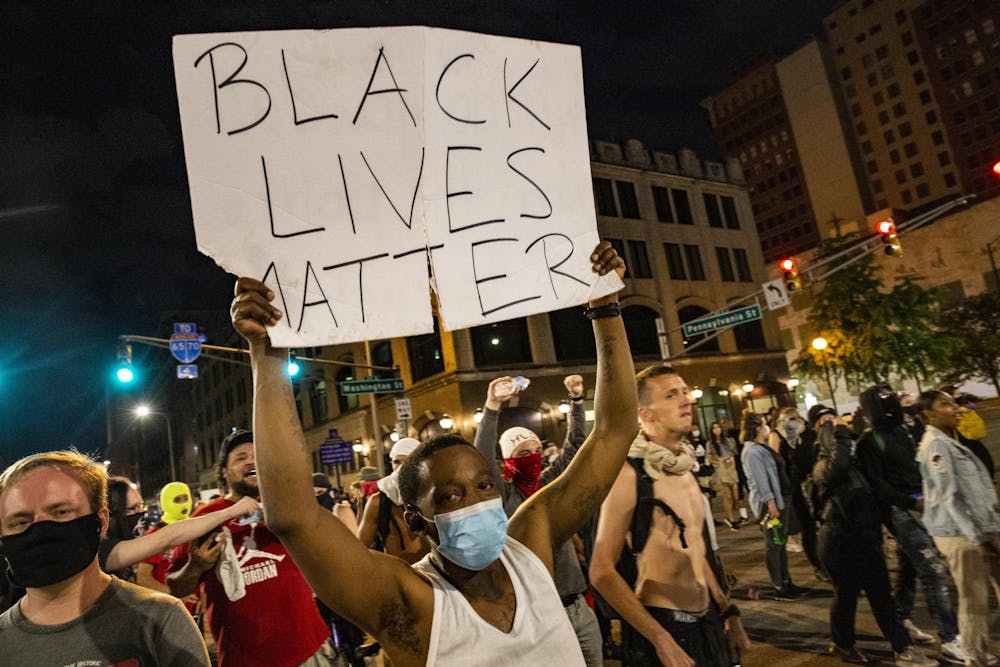Black lives still matter.
However, as of recently, it seems fewer people believe and support that. According to the Pew Research Center, support for the Black Lives Matter movement is down an average of 12% for all adults since June 2020.
It is most noticeably down among white pollers. Their support for the Black Lives Matter movement was a small majority of 60% in June, and as of September, is at 45%.
But the fight for Black lives still continues.
Earlier this month, Jonathan Price was killed by a police officer in Texas after he attempted to nonviolently defuse a domestic dispute.
Thus far, there have only been 14 days in 2020 where police didn’t kill someone. Black people are three times more likely than white people to be killed by police. Since 2013, 98.3% of killings by police have not resulted in any criminal charges.
So why are people bowing out now?
“I feel as if ally support is always fast-burning and short-lived because it’s mostly performative,” said Mary Kiarie, IU student and Faculty & Staff for Student Excellence peer mentor. “We see the flood of support that can last at least a month, but most allies suddenly feel ‘burnt out.'"
The lack of consistency in allyship is not helpful to the cause either.
“It’s not a factor that impacts their daily lives. It always feels as if their past actions are used to save face for the next however many days, months, or years,” Kiarie said.
Earlier in the year, the Black Lives Matter movement was talked about anywhere from the news to Twitter.
“Now that it’s not on the news all the time and people aren’t talking about it as much as they did before, it hasn’t been on everyone’s minds because they don’t see it,” IU sophomore Diamond Blevins said. “It doesn’t affect them like it affects the Black community.”
Earlier this year, the Black Lives Matter movement was touted as possibly the largest in U.S. history. Half a million people protested in around 550 different places in the country, all on one day — June 6.
It’s confusing and disheartening to see support drop off so quickly, especially with an important presidential election approaching. Unfortunately, though, it’s not totally surprising.
“It always comes in waves and is treated as a trend when it takes the forefront of any media outlet,” Kiarie said. “I feel as if this summer, a lot of people showed support for the movement because they felt the pressure to do. No one had an excuse that they ‘weren’t aware.’"
While it is unfortunate that some support for this movement has disappeared, it doesn’t mean the fight is over.
Kiarie stressed the fact that the change happening now will continue to happen, regardless of its popularity in broadcast media or among trending social media hashtags.
All around the country, people have worked — in themselves, with family, friends, coworkers and with perfect strangers — to push for change and equity in the U.S. since well before May 25.
The Black Lives Matter movement, though not always referred to in this way, has been underway since Black people were brought to the Americas as slaves 401 years ago.
Even at IU, the movement — led by students — has continued in various different forms. From public protests to fundraising to supporting Black art and Black businesses, students, faculty and community members have made an effort to continue their activism.
The fight will continue, but it is important that support continues to grow, not regress. In order to push toward the goal of equity for all people, we need all people to help.
“Mass mobilization is what influences the changes and dismantling [of systemic racism] in institutions,” Kiarie said.
It shouldn’t be solely up to Black people to make everything right, especially when systemic racism is not a product of our actions.
“It shouldn’t be up to us to ask for this constant support from our allies,” Kiarie said. “Yet we’re going to have to remind them time and time again that our fight is more than just attending a march or a protest.”
White people can and must use their privilege in this fight.
“They’re entering spaces I can’t get my foot in, but hold no one around them accountable,” Kiarie said.
Blevins emphasized a need for education in this space and about this topic.
“I think the best way to encourage people to support is to help them learn why this is important,” Belvins said.
Anti-racism is a process. It is not something that happens in a day, a month or even a year. It is a continual choice. One that must be made if we are to encourage equity and inclusion and dismantle systems of oppression.
I encourage everyone, but especially white people — self-proclaimed allies or not — to learn and to listen. But don’t become complacent. Don’t stop there. Use what you’ve learned, use your privilege, to fight for change.
Here are a few different detailed lists of resources to aid in the continued learning about and practicing of anti-racism.






